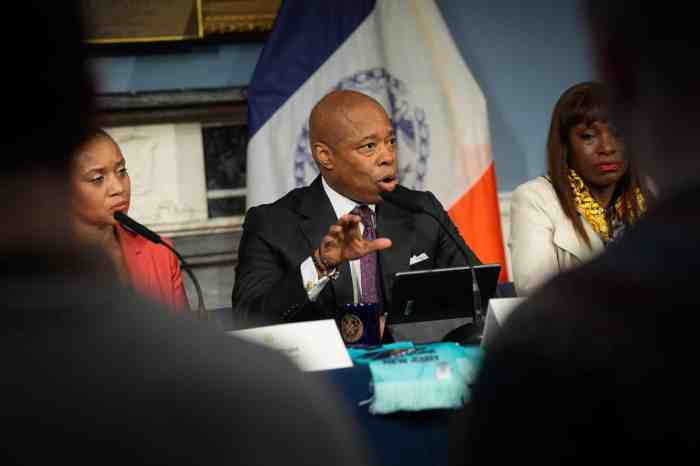BY SHARON WOOLUMS | A huge gap has developed between the will of our community — outraged at continued closings of iconic businesses, demanding that something be done — versus the silence of elected officials who continue to do nothing to protect these threatened merchants, even as the crisis worsens.
I wrote my first column in this ongoing saving-small-businesses series in June 2013. The need for this initiative arose from the clear distress that residents felt about the loss of neighborhood identity as chain stores and banks, one by one, replaced unique and friendly neighborhood businesses. People feel that political influence has been pitted against the desperate needs of a community, and many feel that this putative political influence is winning.
My first column posed the question to all the then-mayoral candidates: “Will a Democrat for mayor stand up for small stores?” No candidate responded.
The candidates’ refusal to give recognition to neighborhood businesses’ struggle to survive led to the second column, on July 3, 2013, headlined: “Who has the guts to fight for our small businesses?”
I was optimistic for good responses for this second piece because of Bloomberg’s anti-small business reign, which saw 83,211 commercial eviction warrants issued and 168,000 stores closed without a court fight.
Though the candidates, in their speeches, had proclaimed small business “the backbone of our economy and the engines of job creation,” the mayoral contenders did not debate each other on this issue. The public needed to know their records.
Instead, we heard boilerplate campaign statements — likely construed by political consults to avoid offending the powerful real estate lobby — touting “tickets and lack of affordable loans” as the merchants’ problems. Small business owners, however, understood that they did not have friends at City Hall, that the real estate lobby seemingly controls small business policy to only maximize their profits — any negative consequences to neighborhoods be dammed.

Today concerned constituents, post-election, must decipher how the “progressive” rhetoric of the campaign translates to the here and now.
“Will you take any action to stop the closing of our small businesses?” was the question I posed to Mayor Bill de Blasio (as I personally handed him my latest column at a Soho art event) and the new speaker (via e-mail). Neither chose to respond.
As in my past columns, the city’s leading small business authority, Sung Soo Kim, here gives accurate evaluations and facts about the politicians’ records. Kim is called the “Godfather of Small Business” due to his founding the Korean American Small Business Service Center; co-founding the New York City Small Business Congress and Coalition to Save New York City Small Businesses; creating the Small Business Bill of Rights given to elected officials since 1993; and his chairmanship of the Small Business Advisory Board, appointed by Mayors Dinkins and Giuliani.
“Like many politicians, candidate de Blasio promised change, ‘a dramatic change of direction from the Bloomberg administration,’” Kim noted. “In my 30 years advocating for small business, no elected official has exhibited as dramatic a change in small business policy as our Mayor Bill de Blasio. He has gone the gamut, changing his assessment of the crisis from ‘rent gouging and extortion’ to ‘fines and lack of access to loans,’ a complete flip-flop from the last election.
“In April 2009, in Washington Heights, I attended the forum ‘Crisis on Main Street, Solutions to Save Hispanic Small Businesses,’ on a study asked for by David Yassky, then-chairperson of the City Council’s Small Business Committee. For the first time in two decades, a government officer publicly acknowledged that small businesses faced a crisis to survive.
“Public advocate candidate Bill de Blasio, making a strong, compelling speech in support of the Small Business Jobs Survival Act, of which he was a proud sponsor, committed to protect immigrant owners’ investment in their communities and stop illegal extortion by unscrupulous landlords.
“At an August 2009 rally on the steps of City Hall, he supported an emergency vote on the S.B.J.S.A. bill to quickly save the city’s small businesses,” Kim continued. “Later, at Jetro Foods, he met with small bodega owners who told of struggles they faced to survive, of month-to-month leases, extortion and rent gouging. Candidate de Blasio expressed outrage at the unfair lease renewal process forcing good businesses to close and hard-working families to lose jobs.
“ ‘It is unacceptable and inexcusable to allow the illegal act of extorting our small business owners to continue,’ ” de Blasio said at that time.
“Hispanic bodega owners placed posters in their windows asking customers to vote for him: ‘He is working to save our businesses and our jobs,’ the posters said.
“Though a self-proclaimed ‘champion for small businesses’ candidate, fighting ‘economic inequality,’ now elected as mayor, de Blasio has kept Bloomberg’s anti-small business agency and policy intact.
“The Small Business Congress wrote to de Blasio after the election, pleading that he select as new Department of Small Businesses Services commissioner, a successful small business owner — preferably Hispanic because of the impressive percentage of stores owned by that demographic.
“We asked that the new mayor reform the Department of Small Business Services, which Bloomberg had established without appointing to it one representative with a small business or ethnic immigrant background. Ignoring our requests and simply moving Bloomberg staff from one department to another, Mayor de Blasio, appointed a new commissioner who had never owned or operated a small business,” Kim said.
“His small business and jobs economic plan is the same, word for word, from the talking points of Bloomberg’s and a continuation of a failed policy. His focus on the wrong problems offers the same meaningless government initiatives with new titles. Not mentioning the S.B.J.S.A. he once sponsored and championed when running for public advocate, he has yet to put forth any other solution to stop the crisis.”
Indeed, the number of court-ordered commercial warrants issued by the city marshal for business evictions has not changed one bit from the Bloomberg administration. Under Bloomberg, there was an average of 485 eviction warrants issued per month in 2012 and 499 per month in 2013. Under de Blasio, there was an average of 491 evictions warrants issued to small businesses per month in 2014.
“Small business owners know they are in a crisis and it’s getting worse,” Kim stated. “They fear the virtual end of the American Dream unless government intervenes on their behalf,” Kim stressed. “I don’t know what changed in de Blasio’s ‘Tale of Two Cities’ small business environment to motivate the change in assessment of needs. I do know, when it comes to economic policy, Mayor de Blasio has failed to keep any of his pledges.”
As for Melissa Mark-Viverito, the City Council’s new speaker, who also failed to respond to questions for this column, Kim was equally critical.
“The single most important elected official’s voice for determining the future of small businesses and their employees’ jobs is the speaker of the City Council,” he said. “Ever since former Mayor Koch encouraged the real estate speculation cancer to spread into our city’s diverse economy, other mayors followed, forming economic policy, agencies and programs to hide deadly consequences for small businesses, jobs, neighborhoods and the economy. Subsequently, the City Council has denied the treatment for this cancer.
“Using the speaker’s office, against the will of the people and the majority of councilmembers, against commonsense sound economic policy, each speaker collaborated with big real estate interests to block any legislation to regulate landlords,” Kim declared. “Whether the new speaker, Mark-Viverito, will encourage or allow new progressive councilmembers to pass legislation will depend upon the mayor, the city’s political machine, and the real estate lobby’s influence over the speaker’s office.
“With this speaker, will only the rhetoric change while special interests continue to dictate small business policy and deny legislation, as with the past three?” Kim asked.
“Unfortunately, Speaker Mark-Viverito does not have as role model a prior speaker, having similar progressive views and independence, for reform of City Hall. The past three speakers were ambitious to run for mayor. Small business advocates blame the promise of real estate campaign funds for influencing and guiding the legislative process at City Hall.
Except for the newest version of the S.B.J.S.A. introduced in June 2014, Speaker Mark-Viverito sponsored the act each time it was introduced. For more than 30 years, a version of this bill was denied a vote in the City Council by previous speakers.
“Former Speaker Peter Vallone singlehandedly lobbied committee councilmembers to change their votes to defeat the bill and prevent its passage,” Kim continued. “Speaker Vallone joined with Mayor Koch to form a Small Retail Business Study Commission to study the problem of high rents. It was called the ‘Limousine Commission’ because most members, handpicked by Vallone and Koch, arrived at the meetings in limousines. Consisting of presidents of real estate firms, Brooklyn Union Gas, savings banks, Wall St. firms, Macy’s and Chase Manhattan bank, etc., the commission took a year and half to reach its conclusion, namely: ‘Government should not interfere in the free marketplace.’
“The last speaker, Christine Quinn, stopped a vote on the S.B.J.S.A. even though the bill had 32 sponsors. The Council’s Small Business Committee Chairperson David Yassky had pledged to pass the legislation, declaring, ‘There was no option to do nothing or the small businesses would disappear!’ But stopped by a bogus claim of legal concerns from the speaker’s office, the bill was never debated publicly nor were changes recommended to the bill’s language to satisfy concerns. Instead, this disingenuous claim was used to deny a hearing on the bill for the past four years. Small business advocates who viewed the speaker’s actions as anti-immigrant and antidemocratic are concerned that those orchestrating this travesty of democracy are still in positions of power.
“The good news,” Kim said, “is that Mark-Viverito is our first progressive Hispanic woman as speaker. With the vast majority of small businesses Hispanic owned and the number-one employers of Hispanic workers, Speaker Mark-Viverito should know these businesses are vital to Hispanic and immigrant families. She knows that if businesses continue to close, a major pathway for social mobility will also close. She, as an immigrant woman, is aware of the large number of minority women these businesses employ, jobs critical for single parents living in an ever-more-expensive city. The Council, now with its greatest number of progressive members ever, if granted freedom and independent actions, could easily pass the S.B.J.S.A. into law.
“But the Council’s Small Business Committee is looking like the same old handpicked political committee, the real estate lobby’s influence once again stacking the deck against small business owners,” Kim said.
“When the original S.B.J.S.A. was first introduced in 1986 by then-Councilmember Ruth Messinger, the leading supporters of this bill were the city’s manufacturers through the Central Labor Council. Recently, Speaker Mark-Viverito announced a major plan to protect and grow our city’s manufacturers. She highlighted manufacturing’s importance to the city’s economy, employing over 350,000 workers, 10 percent of the workforce, and threatened by real estate speculation if government does not do more to protect them. The majority of manufacturers also are small businesses.
“But what about the city’s largest employers, the 200,000 small businesses being destroyed by real estate speculation — are they too worth protecting?” Kim demanded. “Why isn’t the speaker now considering the S.B.J.S.A.? The voters will soon find out just how progressive and independent the new speaker really is.”
Of all the problems facing legislators, finding a solution to stop small businesses from closing is considered by far the simplest and easiest. By passing legislation giving business owners rights to negotiate fair lease terms with landlords, the crisis would doubtlessly end. But the real estate lobby has become powerful and excessively influential, a result of decades-long windfall profits and PACs’ exorbitant campaign contributions.
Constituents question if the real estate industry hasn’t hijacked democracy. They wonder who it is our electeds actually represent. Legislators remain silent as the Village is being destroyed, its cultural and physical fabric unrecognizably transformed.
The news that Cafe Edison was facing closing brought outcry and outrage from patrons and fans, resulting in 10,000 names on a petition drive, citywide media coverage, and a social-media blitz, all making clear that the community demands that something be done.
City Hall’s ignoring this crisis has made it worse and has not proven to be such a great long-term policy. When the foundation is destroyed, the bottom will fall out. The situation is now desperate, and each politician must make a choice. Either they stand with their small business owners and communities to pass legislation leveling the playing field — by giving rights to commercial tenants — or they continue their alliance with the landlords and the political machine by lobbying for no regulation.

















